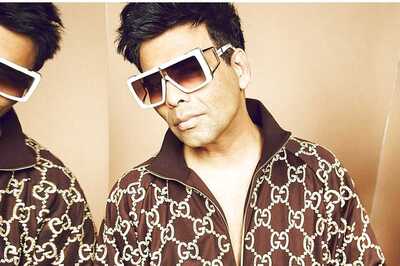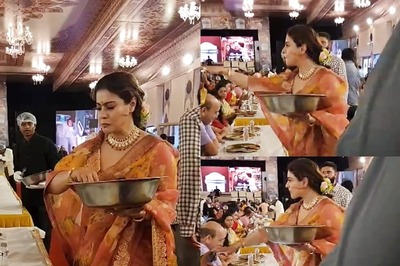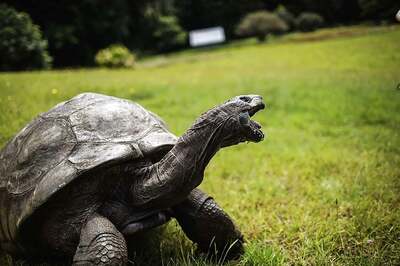
views
New Delhi: Former Union minister and Congress MP Shashi Tharoor wrote in an article recently that three factors—the US-South Korea bilateral relationship, a perception of a lack of conviction on India's part, and the George Bush Administration's desire not to repeat the Kofi Annan experiment of a 'strong' Secretary-General — combined to ensure the US veto that scuttled his candidacy to the post of UN secretary-generals in 2006.
Tharoor told CNN-News18's Pallavi Ghosh that he didn't want to say anything more on the topic than what he has already written, but answered in detail a range of questions from the surgical strikes to the future of Congress party to his perceptions of Prime Minister Narendra Modi.
Q. Do you think India has given Manmohan Singh the respect he deserves? Do you think Congress party has given him the respect he deserves?
Dr Manmohan Singh deserves enormous respect both for his personal qualities – the remarkable human being he is – and for his professional stewardship of the nation at a difficult time. I believe that he has been unfairly tarnished during the 2014 election campaign, but that in retrospect his accomplishments will shine all the more brightly. The Congress party certainly respects him enormously, and I am convinced that history will be kinder to him than today's India has been.
Q. There is a new version of the Great Game being played out in the Indian sub-continent now with an Indo-US axis being countered by an aggressive Pak-China axis, with projects like the China-Pakistan Economic Corridor at the heart of it. As a foreign policy expert, do you think the US has smartly pushed India to a corner in its larger gameplan to counter China?
I don't think that India is that easy to push around! India’s relationships with both the US and China are driven by their own logic, and we have done reasonably well so far in separating our bilateral relations with each, from their relationship with each other.
Q. Is the US a reliable ally? An all-weather friend as they call?
Well, first of all the US is not our ally. We have been careful not to enter into any arrangement that can be termed as an alliance, and we are inordinately sensitive about using the word "ally". The farthest we are willing to go is "partner". I am not sure that all of the US' allies will in any case use terms like "all-weather ally" for them. Washington is a pragmatic capital where sentiment about allies is rarely allowed to intrude in politics – whether domestic political imperatives or geopolitical considerations.
Q. Should India pursue an openly pro-US policy at the cost of alienating China?
I think each of these relationships has its own significance for us. The US is a valuable partner. But there is not much advantage in being seen as an appendage of a big power far away. At the same time, China is a neighbour we cannot afford to alienate. We have a long-stalemated border dispute with them which we don’t want to see flare up. We are trying to improve the balance of trade and to attract Chinese investments. These objectives can and should run on parallel tracks.
Q. Trump vs Hillary…Had you been a US voter, whom would you choose? Who is better for India?
Undoubtedly Hillary, because Trump is manifestly not qualified to lead the US government. As for policies, both will act in their own interests as they perceive them. Those who are carried away by Trump's rhetoric about India don't seem to realize the severe limitations he would face in implementing some of his more controversial ideas. Hillary knows India and will lead an administration that takes mature and responsible decisions. Not all of them will favour India, but at least we know the relationship will be in safe hands.
Q. Coming back to India, this hyper nationalism narrative… is it good for society and nation?
No. Patriotism is a fine thing when channelled constructively – when it seeks to affirm the best about your country and to take legitimate pride in it. But when it becomes a stick to beat others over the head with, when it becomes reduced to narrow-mindedness and bigotry, when it closes the national mind and stifles public conversation, it should be deplored. That is what is happening now.
Q. You maintained a curious silence even when controversy broke on foreign secretary S Jaishankar's briefings to the parliamentary panel on foreign affairs on the surgical strikes. You are the chair of the panel. Is it that you disagreed with Congress playing politics over it?
As I explained at the time, the rules of the Committee prescribe, indeed require, confidentiality. At both the beginning and the end of the meeting I assured the witnesses of confidentiality and it was on the basis of this assurance that they testified. This was why I felt I could not break my own word to them; it would undermine my credibility to future witnesses if they felt my promises to them of confidentiality were insincere. I offered to the Foreign Secretary to lift the confidentiality requirement on his own testimony so that he could clarify what exactly he had said, but both he and the EAM felt this was not necessary.
Q. As a diplomat who has rubbed shoulders with world leaders, do you think our diplomats are particularly vulnerable to political sensitivities? Shivshankar Menon was hauled over the coals by the BJP for including Balochistan in the Sharm-Alsheikh declaration. Now Congress has put Jaishankar on a spot for reportedly accepting before the parliamentary panel that surgical strikes have taken place before too… Are we ruining the legacy of our best diplomats by dragging them into the political muck?
I think some of this comes with the territory – any high-profile position that involves public engagement on matters of interest to the media, always risks a political backlash as well. Still, our political tradition is that the bureaucrats give advice but politicians take the decisions -- and ultimately it is they who should carry the can for these decisions.
Q. What’s your opinion? Personal opinion…. Should the government have been more forthright in providing proof of the strikes? At least to the parliamentary panel?
I had suggested that though for me personally the word of the DGMO was good enough – I do not think our Army would ever lie to the Indian public – and though I did not think the calls to release video evidence were wise, since that could compromise national security, I believe that there would have been no harm in releasing the co-ordinates of the places we struck. Since the Pakistanis know where they were hit, we would not be revealing anything secret, but the incontrovertible facts would have given the lie to the Pakistani propaganda that there were no strikes and the whole thing was just an Indian PR exercise.
Q. Was Rahul Gandhi right to say 'Khoon ki dalali'?
I honestly think the Indian media is excessively fond of focusing on a word or a phrase rather than looking at its meaning or the political intent behind a remark. I've been a victim of that myself, so my sympathies are with Rahulji. He was clearly saying that the ruling party was trying to make political capital out of the blood of our soldiers. Just look at the hoardings and posters the BJP has put out in UP and you will get his point.
Q. The Congress keeps criticising the BJP and the Sangh Parivar for its "authoritarian" tendencies. Doesn't the first family concept or the primacy of a single dynasty make its criticism ring hollow?
No, because our criticism is of a style of functioning, and our "first family", as you put it, is much more democratic in its way of work than the ruling party seems to be. Our point is that there's not much virtue is boasting you are not dynastic if what you have is an anointed autocracy that can’t be questioned. Whereas our "first family" practices a style of leadership that is inclusive, accommodative, collegial and respectful of different points of view.
Q. Old Political movements around the world have to go through periodic reinventions to make them relevant. Does the Congress have any big ideas?
Many. Reinvention is certainly relevant and it is likely to involve a generational shift in leadership. But many of the party's established Big Ideas don't need to be jettisoned – they just need to be reaffirmed and better adjusted and articulated to inspire a new generation of voters.
Q. Does Rahul Gandhi consult you?
On some issues, yes, from time to time. But I do not have a role in the party that warrants me to be consulted on a regular or frequent basis.
Q. What ails the Congress? If you were tasked to fix it, what would you do?
I have aired my views both publicly and privately. No further delays in the leadership transition and organizational change; a strong emphasis on revitalizing the party grassroots machinery; revival of the practice of the party workers using the period between elections to perform social work in their constituencies; and more public communication of the party’s ideas, are among my recommendations. I had also suggested some years ago the creation of a Professionals’ Congress to connect the party to the educated professionals around the country, and have been pushing this concept further.
Q. Was Modi right to use Balochistan to counter Pakistan's meddling in Kashmir?
There's a careful line to be drawn between showing Pakistan that they have a mote in their own eye, and seeming to reduce international politics to a tu-tu-main-main exercise which dilutes our own position – which is that unlike Pakistan, we don't interfere in anybody's internal affairs. Our government has come perilously close to crossing that line and I am glad they seem to have drawn back rather than go on banging this particular drum.
Q. The government claims it has isolated Pakistan internationally. Would you agree with the assessment?
ST: No, because it can’t be done. Both China and the US, and many other countries, have significant and substantial reasons for staying engaged with Pakistan. But if by this claim, our Government means that they have won the support of many countries in conveying to Pakistan that its continued sponsorship of terrorism against India is unacceptable, I think that is largely true – as it was also true under the UPA government in the aftermath of 26/11.
Q. You have said that Pakistan didn't have any opposition to your UN candidature. You had even visited Pakistan and had breakfast with the generals. Do you maintain those friendships? Do they come handy in Track II talks?
ST: No, I didn’t say that. Of course, Pakistan was opposed to my UN candidature. But their opposition does not appear to have been a factor in the US decision to go against me in the race. The US veto was cast for reasons completely unrelated to Pakistan or Kashmir.
Q. PM Narendra Modi praised your speech at the Oxford debate. Would you travel to make India's case internationally if you were to request you to do that?
Of course, that goes without saying. One of my predecessors as Chairman of the Parliamentary Committee on External Affairs, Atal Behari Vajpayee ji, was frequently asked by Prime Minister Narasimha Rao to lead delegations and speak for India abroad. I have long argued that there's no Congress foreign policy or BJP foreign policy, only Indian foreign policy, and all of us on the Committee work to uphold India's national interest. So of course I would accept any such request. But I am not expecting any such offer from the present government.
Q. If you had to pick one attribute, what exactly is it that you would admire in PM Modi?
His personal energy. He is seemingly tireless in his domestic and international travels, maintains a punishing schedule of engagements and speeches, and his voice and spirit never flags. Whether you agree with him or not, this is an admirable quality.
Q. Do you enjoy being a politician? Have you ever thought in this last one decade that maybe, just maybe, you shouldn't have stepped into politics and would have been better off in the seminar circuit or in academia?


















Comments
0 comment